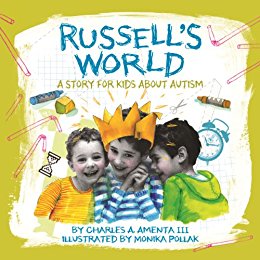“Autism is part of who I am.” Temple Grandin
“Mrs. Amenta, we have to be kind to those poor parents. They have children with autism and have no hope.” For some reason, Dr. Marguerite’s* comment just ticked me off. This was about 18 years ago and I was the president of a local chapter of the Autism Society of America. Dr. Marguerite was a speaker at one of our monthly meetings and I was trying to get things organized before everyone got there. She spoke patronizingly about our members as we got her materials set up. She never realized that I too was one of “those poor parents” and she was actually offending me.
My eldest son has autism and if you think I’m sensitive about it, you would be wrong. I accept it and him for who he is. I love him because he is my son and because, despite his disability, his sweet, loving personality comes through. I am realistic but I also am able to see his potential. It is so much better to focus on what he can do rather than what he can’t. Russell is a person, not a disability, and is worthy of respect.
Our family has tried to put a face on autism by being advocates in our autism journey. My husband, a physician, wrote the first children’s book about autism, which was updated with a new look and title in 2011. I have worked with parents groups, siblings groups and have been a music inclusion consultant. And have been a mentor for choirs of adults with developmental disabilities of all sorts. We are active in advocacy. No one should feel sorry for us; this is our life and we live it as well as we can.
Of course, I fought for him when he was in school. I fought for him to be a music inclusion student when he began high school. At our first IEP meeting, I suggested he be in orchestra as an inclusion student. Our Staffing Team was dumbfounded that I had the nerve to suggest it! What they didn’t realize was the orchestra director was the spouse of my other sons’ piano teacher and I had already spoken with him. He agreed and was excited since he knew Russ came from a family of musicians. The Team finally agreed (I wouldn’t sign the IEP unless they at least tried it) to only the first ten minutes of class. I figured getting his foot in the door was better than nothing.
A week or so later, I got a message from the school, asking me to sign off on an amendment to his IEP. When I returned the call, I was flabbergasted to learn they wanted to extend the time he was in orchestra. The professionals thought since he was doing so well, it would be in his best interest to stay for the whole class. Who was I to argue with the professionals???!!!??? If they wanted to think it was their idea in the first place, far be it from me to rock the boat when I was getting what I wanted. He did extremely well and ended up conducting the orchestra for their Alma Mater at a concert toward the end of high school years. He made many, many friends and enriched his classmates’ lives as well; a win/win as far as I’m concerned.
Dr. Marguerite’s presentation itself was okay all those years ago. The one thing I remember from her speech was that she talked down to us. She seemed to think she had all the answers and if we were more intelligent or educated or…something…we wouldn’t have a child with autism. What she didn’t acknowledge was EVERYONE will affected by disability, through no fault of their own, at some point in their lives. You might have a cousin with Downs Syndrome or a grandparent with dementia. Your mother might have macular degeneration and go blind or your neighbor might have a child with autism. Someone you love will be disabled.
When you are asked to have a music inclusion student in your choir, think how you would feel if it were your child. Don’t feel sympathy for them, feel compassion for them. Instead of focusing on how good it feels for you; focus on how good you are making them feel. It will make you feel good. But whatever opportunities you will be creating for them will far outlast your thrill. And that’s a good thing.
*Name Withheld



Leave a Reply
You must be logged in to post a comment.